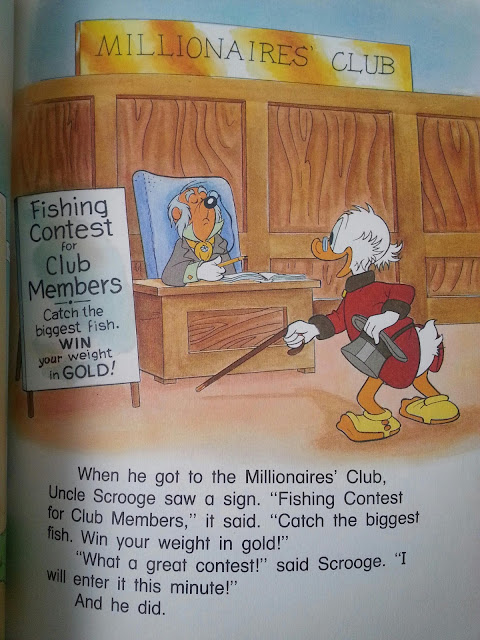This is the first of several entries/essays about children's books featuring "The richest duck in the world"...with no Ducktales logo in sight...
"Scrooge and The Magic Fish" was part of a series of children's books featuring Disney characters called Disney's Fun To Read Library, published by Bantam in 1986. The author and illustrator were not credited, but the art style is not unlike how the characters appeared in the Disney comics of the 1960s and 70s. Published just one year before the premiere of Ducktales, it offers an image of Scrooge that's a bit more complex than he would ever appear in other children's books, aside from adaptations of Mickey's Christmas Carol.
The book adapts the fable of "The Fisherman & His Wife" with Scrooge cast in the role of the fisherman. In the fable, a fisherman catches a fish that will grant a wish for whatever the fisherman desires in exchange for sparing its life. The fisherman agrees, but his greedy wife pressures him into constantly going back and forth to make more demands for a greater prize, each trip trying the fish's patience until he decides the fisherman was better off in the state he was before their encounter - with nothing.
The adaptation changes things considerably by playing off Scrooge's manic, dark side within the context of a simple fable - and he does have a dark side : his vanity, his greed, his insecurity, his bipolar tendencies (content, self-possessed, confident, resourceful one moment...frantic, hapless, paranoid, cynical and fickle the next) - all in a convincing way, along with the change of atmosphere; things literally get darker - storm clouds form, Scrooge's undeserved sense of entitlement makes him oblivious to the dangerous weather, the fish's slow burn... it all works.
Donald Duck appears in the story - he does play the role that the wife played in the fable, but he steps out of character to play the voice of reason and show that even he can be wise. Sometimes. Instead, all the conflict is really supplied by Scrooge, who sees his fortune as "half-empty" and is desperately trying to seize/exploit an opportunity that was only meant as a show of grattitude by a magic creature.
The story ends with the status quo restored: Scrooge is still a tightwad, but he appreciates his hard-earned fortune better than he ever did, as this tale seems to argue.. I really wish I knew who wrote this. There's not a single false note to be found. It wasn't Carl Barks, was it? Could this be a lost tale by The Duck Man?
Here's a hint about the book I'll review next time: scratch and sniff.












How can I find the review of the scratch and sniff?
ReplyDeleteClick on any one of the labels - "Ducktales Anniversary", "Scrooge McDuck" - and you'll find it, along with the 3rd and 4th installment. :)
Delete..and that's if you're viewing the "Web version" - the labels don't appear on the mobile app version. Otherwise, I would suggest browsing through the posts and keep an eye on the title "The Apocryphal Scrooge McDuck".
Delete